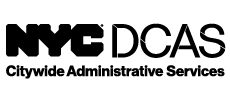
 Department of Citywide Administrative Services311
Department of Citywide Administrative Services311 Search all NYC.gov websites
Search all NYC.gov websites
Nonpublic Schools Frequently Asked Questions (FAQ)
Click a topic, or press the enter key on a topic, to reveal its answer.
1. As of what date am I eligible for reimbursement? Do I need to sign an MOU with the City to receive reimbursement?
Qualifying schools will be eligible for reimbursement for applicable security expenses beginning on the date that DCAS approves the school to participate in the program. However, a qualified non-public school will not receive reimbursement for any security services until an MOU has been signed by the school and DCAS, and is registered with the NYC Comptroller’s Office.
2. How many unarmed security guards will my school be eligible for?
Approved schools that enroll between 300 and 499 students shall be reimbursed for the cost of one security guard;
Approved schools that enroll between 500 and 999 students shall be reimbursed for the cost of two security guards; and
Approved schools shall be reimbursed for the cost of an additional security guard for each additional 500 students enrolled in such school.
3. What service should be selected when filling out the application in HHS Accelerator?
Potentially eligible non-public schools should select childcare and/or academic support service – proof of providing these services will be validated through HHS Accelerator.
4. Does being pre-qualified in HHS Accelerator ensure participation in the program?
No. Prequalification only ensures that a potentially eligible school meets the standards to use HHS Accelerator for this program. Once prequalified, you may also apply to other procurements in HHS Accelerator that your school may be interested in pursuing.
5. My school has multiple BEDS (Basic Educational Data Systems) numbers. How should I apply?
Non-public schools that have multiple BEDS numbers must submit one application per BEDS number. Enrollment data reported on each BEDS form will be used to determine program eligibility. If accepted into the program, enrollment numbers under each BEDS number will also determine the allocation of unarmed security guards and a participating school’s annual budget.
6. Who qualifies as a student for purposes of determining how many security guards a school is eligible to claim reimbursement?
A student refers only to full time students who attend school for a minimum of six hours and twenty minutes a day. Students to whom the City separately provides assistance that includes funding for security are not included in the reimbursement determination.
7. How will schools receive reimbursement?
Schools will receive payment via an electronic fund transfer (EFT) or check, depending on the preferred method of payment selected by the school. Schools can register for the City of New York’s Payee Information Portal to manage their payee information.
8.What salary is expected to be paid to security guards under this program?
Security guards must be paid the prevailing wage plus supplemental benefits for unarmed security guards as determined by the Comptroller of the City of New York in accordance with Article 9, Section 230 of the New York State Labor Law section 230 of the labor law.
9.What is the maximum overtime allowed?
Local Law 2 stipulates overtime for each security guard used cannot exceed 15% of non-overtime hours.
10.Can a school hire multiple vendors?
Yes, a school can hire multiple vendors. Note that if the school hires multiple vendors, the school must consolidate supporting documentation from all of the vendors for the quarterly invoice submission in the HHSA.
11.Why do the schools have to verify that the security firms complied with prevailing wage?
While the qualifying security firms have been informed that it must pay prevailing wage to participate in this program, it is the school’s responsibility to check if the prevailing wage was paid.
12.Can the use of a credit card to pay a Security Guard vendor be used as proof of payment?
Yes, once the security guard vendor’s name is indicated on the credit card monthly statement, it can be submitted as proof of payment.
13.What can be done if the school was billed less than the prevailing wage by the security guard company?
The school must pay the difference between the prevailing wage and the previously paid amount to the security guard company and submit the invoice for the difference, along with sufficient supporting documentation.
14.How can a school update their contact information if there are changes?
Use the Mayor’s Office of Contract Services (MOCS) Contact Form to update your contact information.
15.The security guards hired by a participating school sign-in electronically at a college site instead of using paper sign-in forms. How can we go about providing proof of the guards’ sign-in and out times?
DCAS requires signed paper sign-in documents to prove security guard services were provided during school hours.
16.We have not received a new MOU or approved new budget for the next program year. When can we expect to receive these?
Upon the school registering for the program, DCAS sends a participating school an MOU that is effective for three years. No additional copies of the MOU will be sent to the school. A new budget should be submitted for each program year. Any adjustments should be indicated on the new budget task.
17.For work scopes approved for activities conducted on weekends or after 6:00 p.m., would a participating school still need to submit a request for additional activities?
Yes, a participating school will need to submit a request for additional activities at least two weeks prior to the event start date, or the start date of the first event for a recurring event. Once you receive approval for the additional activities from DCAS, include them with your invoicing documents for reimbursement review.
18.When does the auditing process begin?
Once a school’s MOU has been registered with the NYC Office of the Comptroller, audits can be conducted at any time.


